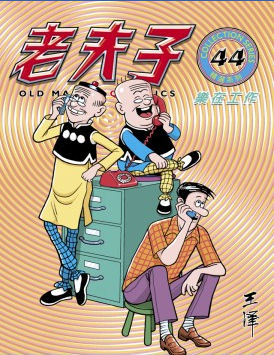
Old Master Q is a Hong Kong manhua created by Alfonso Wong. The cartoon first appeared in the newspapers and magazines in Hong Kong on 3 February 1962, and later serialised in 1964. The comic is still in publication today, and is the oldest Asian comic series in publication.
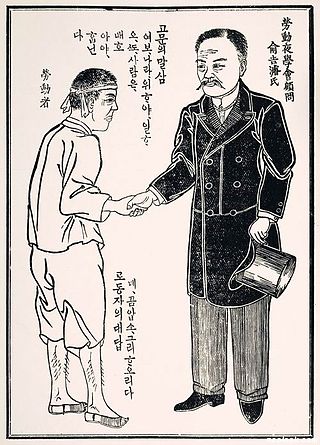
Manhwa is the general Korean term for comics and print cartoons. Outside Korea, the term usually refers to Korean comics. Manhwa is directly influenced by Japanese Manga comics. Modern Manhwa has extended its reach to many other countries. These comics have branched outside of Korea by access to Webtoons and have created an impact that has resulted in some movie, drama and television show adaptations.

Alfonso Wong Kar-Hei, also known by his pen name Wong Chak, was a Hong Kong manhua artist who created one of the longest-running comic strips, Old Master Q, that became popular across Asia.

Manhua are Chinese-language comics produced in Greater China. Chinese comics and narrated illustrations have existed in China throughout its history.
Below the Lion Rock is a TV show about the lives of Hong Kong citizens. It was broadcast during five periods, each forming its own series, from 1972 to 1980, 1984 to 1987, 1992 to 1994, 2006, and 2014 to 2022. Each series was a collection of unrelated stories produced by the RTHK, and depicted the life stories of different social strata set against backgrounds that are today part of Hong Kong history, such as the Shek Kip Mei Fire that burnt down the slums, and the early immigrants from Mainland China. The stories showed the perceptions people had on the society back in those times. It was a very emotionally moving series and was thus highly successful in ratings.

Animation-Comic-Game Hong Kong is a material-entertainment fair and book fair focusing on animations, manga, and games based in Hong Kong. It is held annually at the Hong Kong Convention and Exhibition Centre usually around August, exhibiting and selling comic books and comic-related / animation-related / game-related products. The categories of products and services in ACGHK have steadily expanded over the years.

Fung Wan or Feng Yun is a Hong Kong wuxia manhua series. It is the first manhua released by Ma Wing-shing in 1989 with the help of his assistant Siu Kit under his own company, Jonesky Publishing. Before the third part, the manhua was originally titled Fung Wan, until the two protagonists – Wind and Cloud – became secondary characters and the manhua was renamed Tin Ha. The story has been adapted into media, most notably the Hong Kong films The Storm Riders (1998) and The Storm Warriors (2009), the video game Fung Wan Online, and the Taiwanese television series Wind and Cloud (2002) and Wind and Cloud II (2004).

Lianhuanhua is a type of palm-size picture books of sequential drawings popular in China in the 20th century. It influenced modern manhua.

The Bus Uncle is a Hong Kong Cantonese viral video depicting a verbal altercation between two men aboard a KMB bus in Hong Kong on 27 April 2006. The older and more belligerent of the two men was quickly nicknamed the "Bus Uncle", from the common Hong Kong practice of referring to older men as "Uncle" (阿叔). The altercation was recorded by a nearby passenger and uploaded to the Hong Kong Golden Forum, YouTube, and Google Video. The video became YouTube's most viewed video in May 2006, attracting viewers with the Bus Uncle's rhetorical outbursts and copious use of profanity, receiving 1.7 million hits in the first 3 weeks of that month.

The Ravages of Time is an ongoing Hong Kong comics series created by Chan Mou. It re-tells the events in the late Han dynasty and Three Kingdoms period of Chinese history, with the story largely revolving around the many exploits of a young Sima Yi.
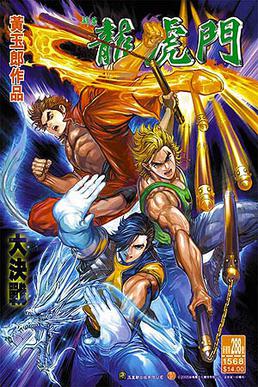
Oriental Heroes is a popular Hong Kong–based manhua created by Tony Wong Yuk-long, a writer/artist responsible for also creating a number of other popular manhua titles. It was created in 1970, and it continues to be published today. The book was the first Hong Kong manhua title based on action and fighting, often borrowing from the wuxia literary world. It established a new action genre of Hong Kong manhua and spawned many imitators. The theme of its stories often revolves around brotherhood and the fight for justice.

Chinese Hero: Tales of the Blood Sword is a wuxia manhua series created by Hong Kong artist Ma Wing-shing. It is also referred to as Blood Sword, Blood Sword Dynasty, A Chinese Hero: Tales of the Blood Sword, and A Man Called Hero.
Hong Kong comics are comics originally produced in Hong Kong.

The Storm Warriors is a 2009 Hong Kong wuxia fantasy film produced and directed by the Pang brothers. It is the second live-action film adaptation of artist Ma Wing-shing's manhua series Fung Wan, following the 1998 film The Storm Riders. The Storm Warriors is based on Fung Wan's Japanese Invasion story arc The Death Battle. Ekin Cheng and Aaron Kwok respectively reprise their roles as Wind and Cloud, who this time find themselves up against Lord Godless, a ruthless Japanese warlord bent on invading China. The film is a co-production between Universe Entertainment and Sil-Metropole Organisation.
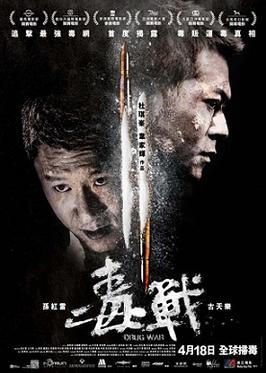
Drug War is a 2012 action thriller film directed and produced by Johnnie To. The film stars Sun Honglei as Police Captain Zhang, who partners with a drug lord named Timmy Choi after Choi is arrested. To avoid the death penalty, Choi agrees to reveal information about his partners' methamphetamine ring. Zhang starts to harbor doubts about Choi's honesty as the police begin to take on the drug ring.
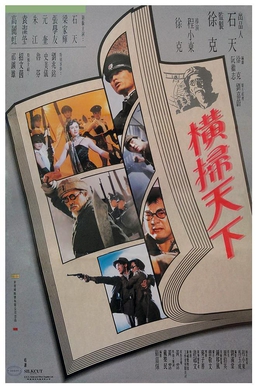
The Raid is a 1991 Hong Kong action film directed by Tsui Hark and Ching Siu-tung and based on the Hong Kong manhua, Uncle Choi, published by Michael Hui from 1958 to the mid-1970s. The film stars Dean Shek, who also served as the film's presenter, as the titular protagonist, while also co-starring Jacky Cheung, Tony Leung, Joyce Godenzi, Fennie Yuen, Paul Chu and Corey Yuen. The Raid is also Shek's final acting role before retiring from the film industry.

Ye Qianyu was a Chinese painter and pioneering manhua artist. In 1928, he cofounded Shanghai Manhua, one of the earliest and most influential manhua magazines, and created Mr. Wang, one of China's most famous comic strips.

Waiting for Uncle Fat is a Hong Kong Internet slang term and an internet meme; “Uncle Fat” is the nickname of rural patriarch Lau Wong-fat. The expression is derived from the 2015 Hong Kong electoral reform vote, when the 31 pro-Beijing camp lawmakers walked out of the chamber just before the vote in order to wait for Uncle Fat to arrive and vote to show their unity. The voting results turned out to be an embarrassing eight votes supporting the reform package. The pro-Beijing camp parties’ reason for not attending the vote – to wait for Uncle Fat – has sparked an intense discussion about the method the pro-establishment parties had used among Hong Kong citizens. Even more, "waiting for Uncle Fat" has become Internet slang and many derivative works or parodies have been created by Hong Kong netizens according to this slang.
Taiwanese animation or Taiwanese donghua can be traced back to 1954's black-and-white animation Wu Song Fights the Tiger (武松打虎) by the Kuei Brothers but the earliest surviving is The Race Between Turtle and Rabbit (龜兔賽跑) produced at the end of the 1960s by the Kuangchi Program Service and was also the first color animation in Taiwan. In the 1970s, Taiwanese animators went abroad to study the animation production techniques in the United States and Japan, opening up Taiwan's OEM animation and homemade industry.

Guzhuang, also called ancient-style dress, refers to a style of Chinese costume attire which are styled or inspired by ancient Chinese clothing. Guzhuang is typically used as stage clothes in Chinese opera and in Chinese television drama, such as in period drama which are normally set in imperial China prior to 1911, and in the Wuxia and Xianxia genre. While the style of guzhuang is based on ancient Chinese clothing, guzhuang show historical inaccuracies.

















